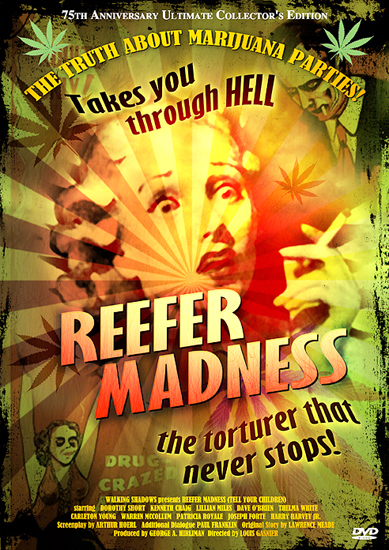“˜Reefer Madness’ documentary screening tonight celebrates its 75th year

Walking Shadows will release the 75th Anniversary Ultimate Collector’s Edition of the first anti-drug propaganda film, “Reefer Madness,” today.
By Devon McReynolds
April 19, 2010 9:00 p.m.
April 20 is the high holy holiday for stoners across the world (pun definitely intended), and you can bet Snoop Dogg will be celebrating with a joint or two or twelve. But back in the old days, the notion of a day dedicated to the smoking of the “devil’s weed” would literally be considered a diabolical activity.
Tonight, you can celebrate the changing times by viewing “Reefer Madness,” which is commemorating its 75th anniversary with a screening at the Vine Theater in Hollywood.
“Reefer Madness” was created in 1936 as a propaganda film warning against the dangers of smoking “Marihuana.” The film revolves around a drug-dealing couple who entice local, disgustingly clean cut, WASP-y high school kids into their apartment to smoke “reefer,” dance the jitterbug and (gasp) kiss each other. The kids immediately get hooked on the reefer, which directly causes their descent into lives that are destroyed by manslaughter, rape, murder and insanity.
The main action of the film is preluded by a textual warning that classifies “marihuana” as “The Real Public Enemy Number One!” that causes “violent, uncontrollable laughter,” “dangerous hallucinations” and “the loss of all power to resist physical emotions … leading finally to acts of shocking violence, ending often in incurable insanity.” The prelude ends with a hysterical warning to parents: “The dread Marihuana may be reaching forth next for your son or daughter … or yours … or YOURS!”
Alex Nohe, president of Walking Shadows, the distribution company responsible for the anniversary edition of the film, first saw “Reefer Madness” when he was 14. Despite not knowing the history of the film, he was struck by its irony and camp.
“In the ’60s, it caught on as midnight stoner hit like the Cheech and Chong stuff,” Nohe said. “Now at 75 years, people are still watching it at parties or for fun.”
Aside from the outdated message of marijuana as a “scourge of the youth,” the cheesy production style of the film itself is what makes it so amusing to viewers today.
Mary Corey, a lecturer who teaches courses on modern cultural and intellectual history at UCLA, also saw the film as a teenager in the ’60s.
“If you look at pre-war and post-war movies, the type of melodramatic overkill in the form of the alarm bell chiming was completely outdated almost as it was being made,” she said. “The movie is a joke in and of itself, but even towards non-stoners, it still looks ridiculous.”
In addition to the film, there are two hours worth of DVD extras pertaining to old-fashioned views on marijuana. A Betty Boop cartoon, “Happy You and Merry Me,” uses a cat’s loopy and ecstatic reaction to catnip as a metaphor for marijuana use. Another clip of jazz musician Cab Calloway performing “That Funny Reefer Man” is an energetic and light-hearted song about a funny stoner.
There’s even a clip called “Hemp for Victory” from the U.S. Department of Agriculture during World War II that enunciates practical uses of hemp plant, and how it can contribute to the war effort. “Be careful how you use it,” it warns.
The cult following of “Reefer Madness” has lent itself to more modern interpretations, including a made-for-TV movie in 2005. Fourth-year history student Logan Craig saw this contemporary version a couple of years ago.
“I thought it was a very humorous take on an antiquated public service announcement,” Craig said. “It was lyrically clever, and it made the heightened fear around marijuana use seem ridiculous.”
Now, with the legalization of marijuana as a hot political topic, it’s apparent that attitudes toward the use of it ““ for both medicinal and recreational purposes ““ have come a long way in a very short amount of time.
“”˜Reefer Madness’ may be the ultimate example of the speed of which the culture is moving at the end of the ’30s and how World War II changes everything,” Corey said. “The entire society is more cosmopolitan, and change is happening quicker and quicker.”


